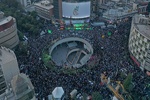The conservatives are concerned that large scale privatization would open the door to FDI and ultimately the culture. The conservatives are acting more cautiously and protectively. On the other hand the reformists, in line with the Fourth Five-Year Economic Plan (2000-2005), are keen on opening the door to foreign investment and privatization in order to liberalize the economy. It is worth mentioning that both these factions agree in principle on the issues of privatization and FDI. It is the pace that they differ on.
This situation became worse when President Khatami’s reformist government started working with the conservative seventh Majlis (parliament) which came to power in May. The resignation of vice-president, Mohammad Ali Abtahi and impeachment of the roads and transport minister, Ahmad Khorram, made front page headlines. The bickering between the Cabinet ministers and the lawmakers continues to get front page coverage in the media.
As a result, a lot of projects have been put on hold or canceled. Agreements with the Turkish telecommunications and engineering firms are examples and as a result Khatami ended up canceling his trip to
In order to analyze the situation it is best to review some recent developments of the new Majlis and viewpoints from both sides:
PRIVATIZATION
Privatization in
On August 17 Majlis voted against moves to privatize state-run banks and allow foreign branches to open in
In the same debate another parliamentarian Abbas-Ali Akhtari encouraged this move saying “Article 81 of the Constitution clearly says giving concessions … to foreigners is completely banned.”
One of the 48 reformists still remaining in
In this session the parliamentarians also trampled on an energy reform bill that would have allowed discoverers of oil to exploit their finds.
In reaction the director of the exploration department of National Iranian Oil Company (NIOC), Mahmud Mohaddes, said no international company will be willing to take the risk of exploring a field without having the privilege on its further development and as a result “… the plans for exploring 16 oil blocks may also change.”
Later on the Spanish oil group Repsol YPF signed an exploration contract, worth up to $39 million, with NIOC on October 13th for two oil blocks in the
In another related development in October the Expediency Council,
In an interview with Iran News (published Nov. 2), Nateq-Nuri, a current Expediency Council member and a senior adviser to the Supreme Leader commented on Article 44 of Constitution: “When the constitution was being written by the late Dr. Beheshti, he cleverly wrote it in a way as to leave room for flexibility. Under this expanded definition of Article 44, privatization and boosting the private sector shall be encouraged, which is both constitutional and in line with the orders of the Supreme Leader.”
The changes in Article 44 drew instant reaction from conservative daily Jomhuri-e Eslami: “We have repeatedly warned about doctoring Article 44 and the negative consequences of entrusting sensitive and vital state bodies to the private sector.”
Articles 124 & 130
In an open session on September 19th the Majlis voted in favor of the double-urgency bill to amend articles 124 and 130 of the 2000-2005 Economic Development Plan. The bill mandates the government to seek approval of Majlis for investment projects for foreign ownership.
Earlier in the year (starting March 2004) the government had signed several agreements with foreign companies which could be subject to amendment.
Conservatives contended that the deal with Turkcell would permit it to listen to cellphone calls in
In later developments since throwing doubt on the Turkish deals, the conservatives examined the deal with the French carmaker Renault. On October 13th, Ahmad Tavakkoli, head of the
Renault, whose executives in
WTO ACCESSION
Hojjatollah Ghanimifard, Oil Ministry’s director for international affairs, in an interview with the Iranian Students’ News Agency (ISNA) in September said accession to WTO will bring greater competitiveness in the national economy but warned that “oil dependent economies must assess whether WTO entry would be in their interest.” The official further noted that if the country does not prepare fully for WTO accession it could lead to rise in unemployment rate and decelerate efforts to improve social welfare.
In a related development
With 147 members WTO is currently having a new round that would cut import duties and reduce subsidies, a move that is presently not conceivable in
CONCLUSION
Although foreign investment and privatization are trends that have lead to prosperity in the world, but if this process is not supervised by the government and allowed to proceed unchecked, it can mean disaster for certain industries, labor force and natural resources.
The North American Free Trade Agreement (NAFTA) was signed in 1987 between
On the other hand, in order to encourage transfer of technology into the country,
The best case scenario is to have a consensus for the common objectives of privatization and foreign investment in the country. The sooner such a consensus is reached the faster the country can embark on its economic objectives and the less divided the politicians.

























Your Comment